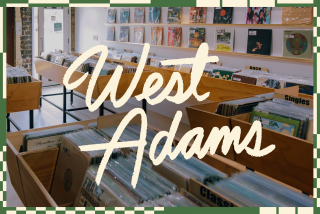Letters to the Editor: Some arguments for preserving South L.A. have a familiar, racially-charged ring

- Share via
To the editor: As a Black resident of Los Angeles living in a home that is now far more valuable than I ever imagined when I purchased it in the mid-1970s, I understand the complexities of contemporary real estate, gentrification and generational wealth. (“A solution for gentrification in South L.A.? ‘Don’t sell your damn house!’” column, Oct. 22)
But I reject the implied proposition that to preserve a cultural enclave like South Los Angeles, you must refuse to sell a house to the highest bidder if that bidder is white or a member of some other group.
Surely columnist Erika D. Smith sees the irony in this, that the arguments used to protect ethnic enclaves are the same arguments used by whites to refuse to sell to nonwhites for decades: We need to feel safe and be with our own, we need to preserve our community, and we need to keep property values high.
And why should only ethnic minorities resist the profit motive? Why should they assume that their cultural heritage can only be protected or survive if the community remains segregated?
Sidney Morrison, Los Angeles
..
To the editor: My sister and I grew up in the 1940s in El Sereno, where we were two of a handful of Jewish kids in our school. My sister had no friends.
My mother’s dream was to move to a Jewish area in West Los Angeles, and when we finally did, my sister went to a heavily Jewish high school. Now, at the age of 90, she still has close friends from that school.
Smith mentions Black families who have moved into Black neighborhoods for the sake of their children and their own enjoyment. The fact remains that most people like to associate with others who are like them.
Real estate covenants used to routinely restrict the sale of homes to African American buyers, just as many covenants restricted sales to Jews. So, Jewish neighborhoods developed, and as a Jew, I can understand why members of other groups want to live among their own people.
We all claim to look forward to the day when people of every race and religion live together in harmony. But individuals still like to be with others of their own kind — even of their own economic level. This is human nature.
Martin A. Brower, Corona del Mar
..
To the editor: The first sentence is verbatim from Smith’s column on housing and gentrification in South L.A. The second sentence is an echo from the past.
“She’s developed a niche market in South L.A. selling homes to an exclusive clientele of Black professionals.”
“She’s developed a niche market in L.A. selling homes to an exclusive clientele of white professionals.”
For the development of racial equity, both sentences are wrong.
Bryn Mathieu, Los Angeles
More to Read
A cure for the common opinion
Get thought-provoking perspectives with our weekly newsletter.
You may occasionally receive promotional content from the Los Angeles Times.









